Warning Signs of Stress
When someone is experiencing a mental health challenge, they may not even realize it. Here’s how you can identify someone who may be at risk.
- Change in routines: Farmers or members of the farm family may change who attends a market, stop attending regular meetings or religious activities, drop out of other groups, or fail to stop at the local coffee shop or feed mill.
- Decline in the care of domestic animals: Livestock or pets may not be cared for in the usual way.
- Increase in illness: Farmers or farm family members may experience more upper respiratory illnesses (cold, flu) or other chronic conditions (aches, pains, persistent cough, migraines).
- Increase in farm accidents: The risk of farm accidents increases with fatigue or loss of ability to concentrate. Children may be at risk if there isn’t alternative child care.
- Decline in appearance of farmstead: The farm family no longer takes pride in the way farm buildings and grounds appear.
- Signs of stress in children: Farm children may act out, show a decline in academic performance, or be increasingly absent from school. They may also show signs of physical abuse or neglect, or become depressed.
- Decreased interest: Farmers or farm families may be less willing to commit to future activities, sign up for gatherings, or show interest in community events.
Source: NY FarmNet
Five Steps to Help Someone at Risk
- Ask
- Keep them safe
- Be there
- Help them connect
- Follow up
Source: National Institute of Mental Health
Managing & Breaking the Cycle of Chronic Farm Stress
Based on more than three decades of working with farmers and ranchers and others in the agricultural industry, this paper by Dr. John Shutske of the University of Wisconsin-Madison Extension answers questions such as:
- What causes stress for farmers and those who care about them?
- How do farmers and farm families successfully cope with stress?
- How can farmers and their families help themselves when there is too much stress?
See this resource with great tips on how to manage and reduce farm stress.
